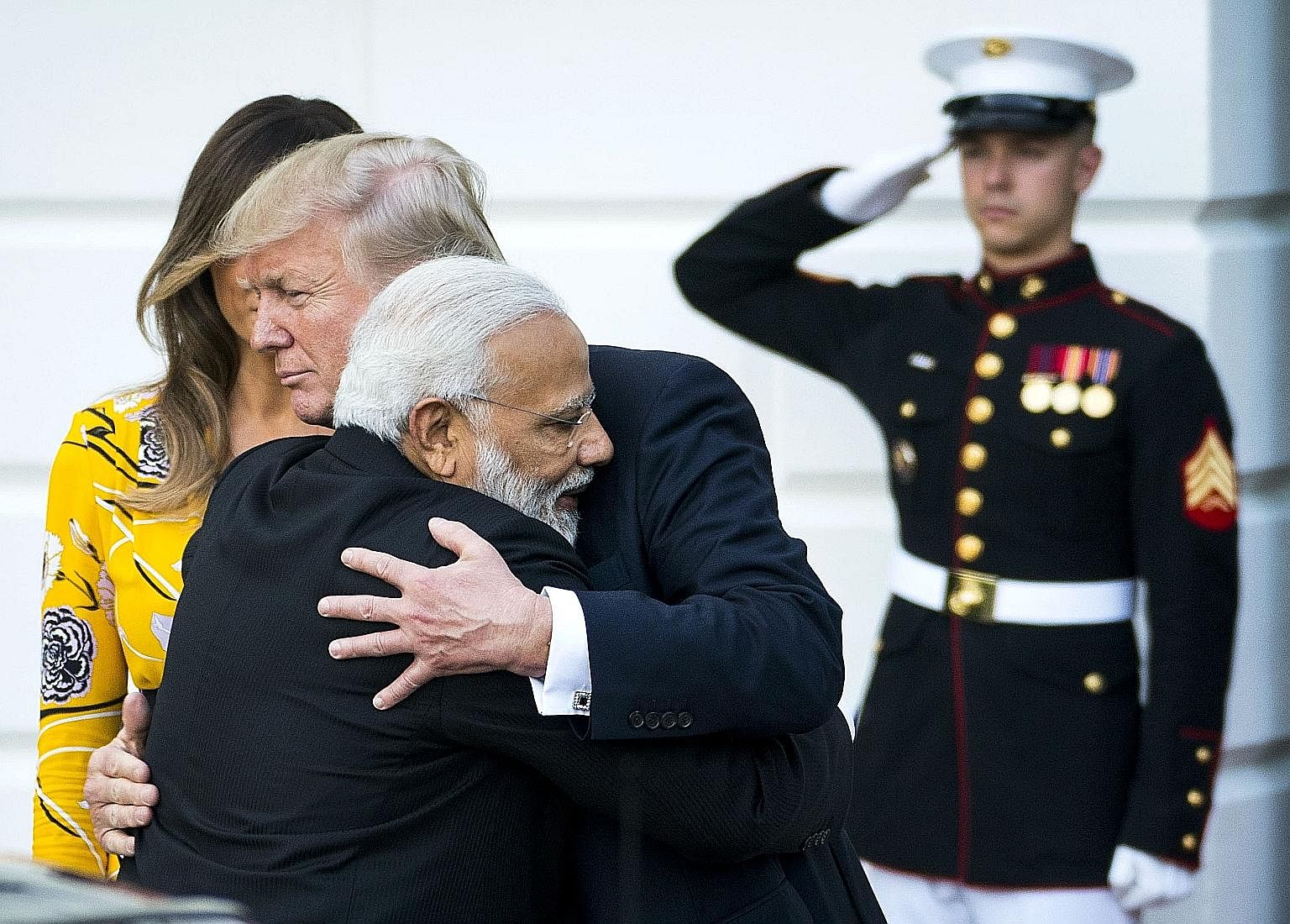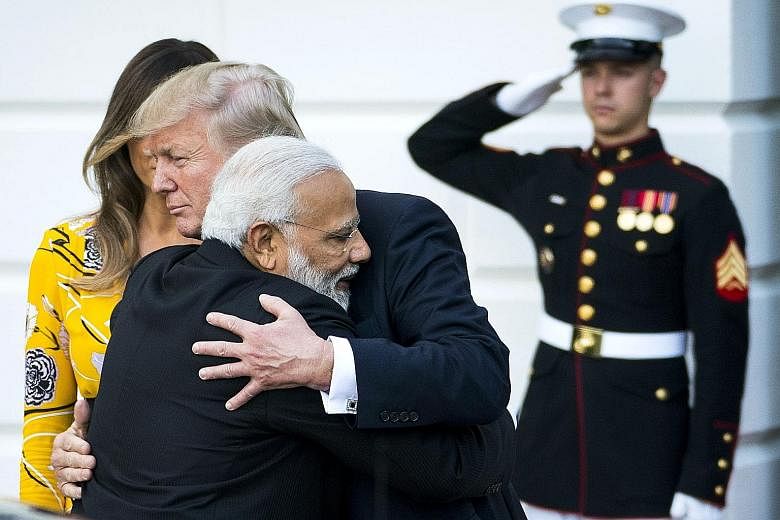US-India relations seem set to deepen under the Donald Trump administration, with Indian Prime Minister Narendra Modi appearing to hit it off with the United States President in their first face-to-face meeting at the White House.
The meeting, while thin on deals, dispelled Indian anxiety over the Trump administration's views on the US-India relationship. It avoided potentially contentious issues - trade, visas and differences on climate change - and sent positive signals on strategic alignment in security and defence.
Most importantly, analysts said, the two leaders appeared to get on well.
"The main objective was simply to have these two men meet and weigh in on their views of the bilateral relationship," Mr Michael Kugelman, senior associate for South Asia at the Woodrow Wilson Centre, wrote in an e-mail to The Straits Times. "It is quite clear from the joint statement that they view it as broad-based and multifaceted. It's safe to say the health of the US-India relationship remains quite robust."
Mr Modi, known to hug leaders he gets on with, twice hugged Mr Trump in the Rose Garden on Monday as they spoke to the media. The two exchanged a hug a third time later at a dinner at the White House.
Mr Trump, in a brief statement to the media, said: "The future of our partnership has never looked brighter."
Mr Modi told reporters the US and India were global economic engines, and the US was the primary partner for India's economic transformation.

A joint statement mentioned US-Indian "strategic convergence" and said close partnership between the US and India was central to peace and stability in the region.
-
Key outcomes of meeting
-
DEFENCE AND SECURITY
The United States will sell Sea Guardian unmanned aerial drones, Apache attack helicopters and C-17 transport aircraft, increasing bilateral defence trade to nearly US$19 billion (S$26.3 billion).
India is also considering F-16 and F/A-18 fighter jets. The US will continue to participate in joint and multilateral military exercises, and exchange information on known and suspected terrorists.
Both countries will hold close consultations in support of Afghanistan's future. In September, the US will co-sponsor the India-Afghanistan Export, Trade and Investment Fair in New Delhi.
The leaders called on Pakistan to ensure that its territory is not used to launch terrorist attacks on other countries.
TRADE AND ENERGY
Two-way trade in goods and services reached US$114 billion last year. The US and India will review trade relations with the goal of expediting regulatory processes, encouraging technology and innovation, increasing market access in agriculture, information technology and manufactured goods and services, and addressing excess capacity in industrial sectors.
The US is looking forward to selling more aircraft to private airlines in India, and negotiating a long-term contract for supply of natural gas. India is finalising a contract for six Westinghouse Electric AP-1000 nuclear reactors to be built in Andhra Pradesh.
PEOPLE TO PEOPLE
The US and India will co-host a global entrepreneurship summit this year in India; Ms Ivanka Trump has accepted Prime Minister Narendra Modi's invitation for her to head the US delegation. President Donald Trump has also accepted Mr Modi's invitation to visit India.
There are nearly four million Indian-Americans in the US, while more than 700,000 US citizens live in India. More than 166,000 Indian students studied in the US last year, contributing US$5 billion in economic activity and supporting some 64,000 US jobs.
The US has begun accepting applications from India for the expedited entry programme, facilitating travel in both directions that will lead to more business, investment and tourism.
Nirmal Ghosh
The two leaders had "resolved to expand and deepen the strategic partnership between the countries and advance common objectives". These included combating terrorist threats, promoting stability across the Indo-Pacific, increasing free and fair trade, and strengthening energy linkages.
The outcome was widely welcomed in India, with the Indian media especially noting that the leaders "called on Pakistan to ensure that its territory is not used to launch terrorist attacks on other countries".
This came after the designation by the US of Pakistan-based Syed Salahuddin, 71, chief of the terrorist group Hizb-ul-Mujahideen, as a Global Terrorist.
Concerns about China were also notable, said analysts. The joint statement reiterated the importance of "respecting freedom of navigation, overflight and commerce throughout the region", while ensuring "respect for sovereignty and territorial integrity" in regional economic connectivity projects.
"The significant takeaway is the subtext about China with reference to freedom of navigation and transparency in connectivity projects," said Indian strategic affairs expert C. Uday Bhaskar. India has objected to China's One Road, One Belt project because it passes through disputed territory in Pakistan.
While calling the Washington meeting a "good beginning", Mr Naresh Chandra, former Indian ambassador to the US, voiced caution, saying it remained to be seen how the two countries will deal with contentious issues. "Mr Trump carries excess baggage of his electoral promises and his approach is very transactional. So it's a good beginning and there is no negative fallout. But let us see how it blows on the terrorism front (with regard to Pakistan) and other contentious areas."
While India favours the US beefing up its troop numbers in Afghanistan, Indian security experts say that will have limited effect if Taleban forces fighting the Afghan government and US troops continue to find refuge across the border in Pakistan.
In Beijing, the nationalist Global Times newspaper on Monday said: "Indians might feel a sense of pride as the strategic importance of their country in counterbalancing China was hyped by US think-tanks and media outlets. However, being a key piece in the jigsaw for the US is nothing to be proud of."
"Washington's pursuit of closer ties with New Delhi is mainly driven by its strategic need to utilise India as a tool to counterbalance China," it added.
But in Washington, India was assured of the stability of the strategic alliance, received help in fighting terrorism, and Mr Trump recognised the positive momentum of India's economy, noted Ms Nisha Biswal, a former assistant secretary of state for South and Central Asian Affairs, now with consultancy Albright Stonebridge Group.
"The partnership continues to be on a strong and stable footing," she said.

